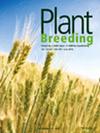Genetic loci associated with Fusarium wilt resistance in tomato (Solanum lycopersicum L.) discovered by genome‐wide association study
IF 1.8
4区 农林科学
Q2 AGRONOMY
引用次数: 0
Abstract
Abstract Fusarium wilt (FW), caused by Fusarium oxysporum f. sp. lycopersici ( Fol ), has impacted global tomato production. This study aims to identify single nucleotide polymorphisms (SNPs) and candidate genes associated with FW resistance against different Fol isolates in tomato accessions using genome‐wide association studies (GWAS). Ninety‐four tomato accessions were evaluated for FW resistance and subjected to GWAS analysis. Broad‐spectrum tomato accessions demonstrated resistance to Fol in at least two isolates, exhibiting a disease severity index (DSI) of 0%. Thirty‐two SNP loci were significantly linked to the DSI of Fol isolates TFPK401, BK2269 and NP‐T4, clustering on chromosome 6. Among these, 12 common significant SNPs were associated with the DSI of at least two Fol isolates, while four unique SNPs were specific to TFPK401 or NP‐T4. Furthermore, candidate genes associated with disease response to Fol infection were identified within a 37.9–41 Mb region flanking the SNPs. These findings contribute to a deeper understanding of resistance mechanisms against Fol infection in tomatoes, potentially aiding the development of effective breeding strategies for Fusarium wilt resistance.全基因组关联研究发现番茄(Solanum lycopersicum L.)抗枯萎病相关基因位点
摘要由番茄枯萎病(Fusarium oxysporum f. sp. lycopersici, Fol)引起的番茄枯萎病(Fusarium wilt, FW)严重影响了全球番茄生产。本研究旨在利用全基因组关联研究(GWAS)鉴定番茄材料中与不同Fol菌株抗FW相关的单核苷酸多态性(SNPs)和候选基因。对94份番茄材料进行了FW抗性评估,并进行了GWAS分析。广谱番茄在至少两个分离株中表现出对Fol的抗性,显示出疾病严重程度指数(DSI)为0%。32个SNP位点与Fol分离株TFPK401、BK2269和NP‐T4的DSI显著相关,聚集在6号染色体上。其中,12个共同的显著snp与至少两个Fol分离株的DSI相关,而4个独特的snp特异于TFPK401或NP‐T4。此外,在SNPs两侧的37.9-41 Mb区域内发现了与Fol感染的疾病反应相关的候选基因。这些发现有助于更深入地了解番茄对枯萎病的抗性机制,可能有助于开发有效的抗枯萎病育种策略。
本文章由计算机程序翻译,如有差异,请以英文原文为准。
求助全文
约1分钟内获得全文
求助全文
来源期刊

Plant Breeding
农林科学-农艺学
CiteScore
4.40
自引率
5.00%
发文量
74
审稿时长
3.0 months
期刊介绍:
PLANT BREEDING publishes full-length original manuscripts and review articles on all aspects of plant improvement, breeding methodologies, and genetics to include qualitative and quantitative inheritance and genomics of major crop species. PLANT BREEDING provides readers with cutting-edge information on use of molecular techniques and genomics as they relate to improving gain from selection. Since its subject matter embraces all aspects of crop improvement, its content is sought after by both industry and academia. Fields of interest: Genetics of cultivated plants as well as research in practical plant breeding.
 求助内容:
求助内容: 应助结果提醒方式:
应助结果提醒方式:


